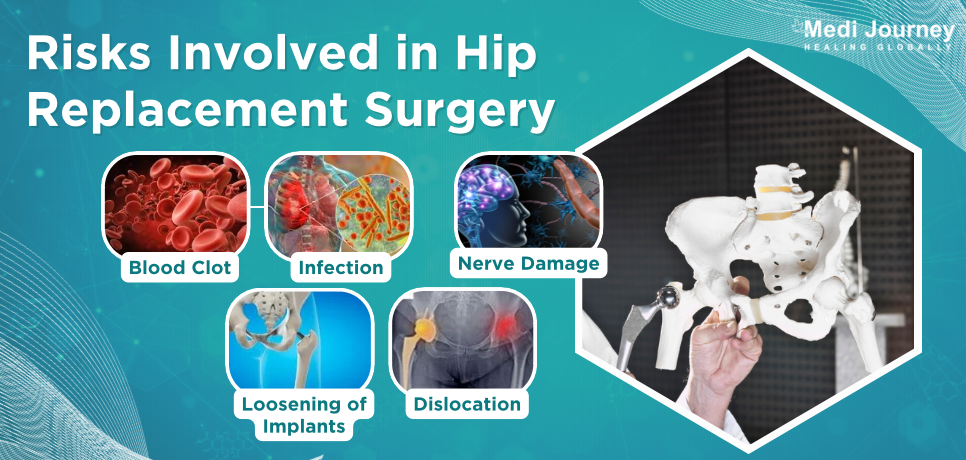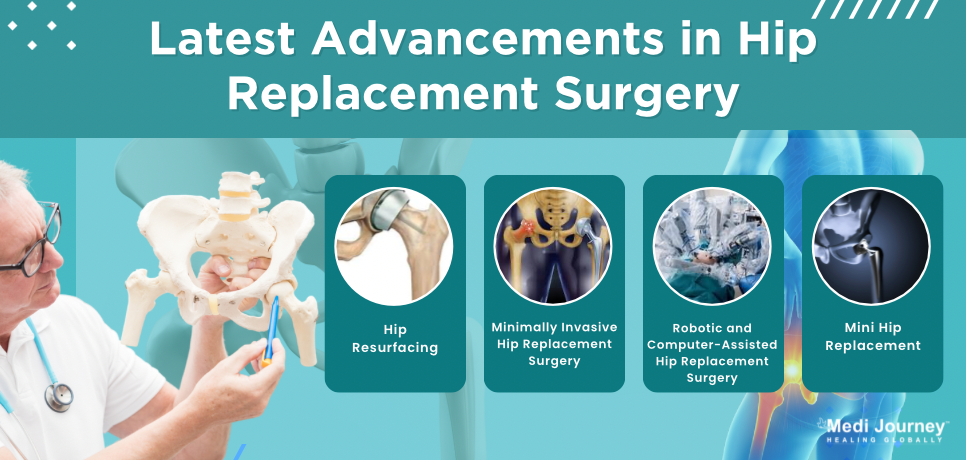Best Liver Transplant Surgeons in Artemis Hospital Gurgaon
 24 December,2025
Read More
24 December,2025
Read More
Enquire now in case of any assistance needed
 19 March,2024
19 March,2024

Conditions like arthritis and hip fractures make it difficult to perform even the easiest tasks, like getting in and out of bed. The initial course of treatment involves medications, the use of walking aids, a change in lifestyle, and physical therapy. When these fail, an orthopedic surgeon will recommend hip replacement surgery.
Ever since the first attempt at hip replacement surgery in 1891, the procedure has witnessed significant improvements. With minimally invasive and computer-assisted technology, hip replacements today have a success rate of over 95%.
Whether you have already decided to undergo hip replacement surgery or are just exploring the procedure, this blog will give you all the necessary insights. You will learn about the surgical procedure, how it is performed, the risks involved, and the latest advancements in hip replacement techniques.
Fill up the form and get assured assitance within 24 hrs!
Hip replacement/arthroplasty is a surgical technique for replacing the damaged and pain-causing hip joint with prosthetics. The hip joint is amongst the largest ball-and-socket type of joints in the human body. It consists of a ball at the top of the femur (thigh bone) and a socket (in the acetabulum, a part of the pelvis bone). Hip replacement surgery may involve replacing both or one part of the joint.
Two types of hip replacement surgery are –
Certain conditions like arthritis cause severe pain, making it hard to do simple activities like standing, walking, and doing everyday chores. When medicines, physical therapy, and the use of cranes/walkers do not help elevate pain, the orthopedic specialist will recommend a hip replacement surgery.
The hip replacement surgery will be the right option if you have any of the following conditions.

A hip replacement surgery is a major orthopedic procedure. Although generally considered safe, it has a few risks.
A hip replacement surgery is a big event in a patient's life. It would help if you are mentally prepared before undergoing the surgery. A positive mindset and complete trust in the surgeon are necessary for successful outcomes.
Before your hip replacement surgery, you will have a prior consultation with the treating surgeon. A few things you can expect during initial consultations are –

Continuous research and development is going on in the field of orthopedics. The recent advancements in hip replacement surgery are –
Hip replacement surgery addresses hip pain and stiffness for people with avascular necrosis, arthritis, trauma, or other forms of hip joint damage. An orthopedic surgeon will replace the damaged hip joint with a prosthesis (artificial joints) during the surgery. Various surgical approaches exist to hip replacement surgery, including minimally invasive and robot-assisted options that may be appropriate for you. Following the doctor’s advice is necessary for a quick recovery. It will help you return to everyday activities with fewer complications and less pain.
Fill up the form and get assured assitance within 24 hrs!
Doctor of Pharmacy
Dr. Deepanshu Siwach is a skilled clinical pharmacist with a Doctor of Pharmacy degree.?He has 4+?years of experience and has worked with thousands of patients. He has been associated with some of the top hospitals, such as Artemis Gurgaon.
Director
Orthopedic and Joint Replacement Surgeon
Aakash Healthcare Super Speciality Hospital, Dwarka, New Delhi
Dr. Aashish Chaudhry is amongst the best Orthopedic Surgeons, with over 23 years of experience....
Senior Consultant
Medical Oncologist
Nanavati Super Specialty Hospital, Mumbai
WhatsApp UsSenior Director
Gynecologist and Obstetrician, IVF Specialist
Max Super Speciality Hospital, Shalimar Bagh, New Delhi
WhatsApp UsSenior Director
Gynecologist and Obstetrician, IVF Specialist
Max Smart Super Speciality Hospital, Saket, New Delhi
WhatsApp UsSenior Director
Gynecologist and Obstetrician
Max Smart Super Speciality Hospital, Saket, New Delhi
WhatsApp UsSenior Director
Gynecologist and Obstetrician
Max Smart Super Speciality Hospital, Saket, New Delhi
WhatsApp UsSenior Director
Gynecologist and Obstetrician
Max Smart Super Speciality Hospital, Saket, New Delhi
WhatsApp UsThe Art of Effective Communication
 24 December,2025
Read More
24 December,2025
Read More
 23 December,2025
Read More
23 December,2025
Read More
 17 December,2025
Read More
17 December,2025
Read More
 16 December,2025
Read More
16 December,2025
Read More
 10 December,2025
Read More
10 December,2025
Read More
 09 December,2025
Read More
09 December,2025
Read More
Trusted by Patients
"I am Asim from Bangladesh and was looking for treatment in India for neuro. I visited many websites to get the complete information regarding the treatment but I was not satisfied as I was getting confused. In the meanwhile, one of my friends suggested I seek help from Medi Journey as he experienced his medical journey very smoothly and was satisfied with it. They have filtered the top 10 doctors as per experience, the success rate of surgery & profile, so it helps us to choose the best treatment in India. "
"For my knee surgery, Medi Journey guided me to BLK Hospital where I received exceptional care. The team's support and the expertise at BLK Hospital exceeded my expectations. Thank you Medi Journey for making my medical journey stress-free. "
"I came from Iraq for my granddaughter's eye surgery in India facilitated by Medi Journey, due to critical cases they advised us to get a second opinion from the different hospitals before going to surgery. Finally, we went to Fortis Escort Hospital, which helped us to get more confidence for diagnosis. Fortis Escort Hospital has the best eye surgeon team with the latest instruments. Thanks to all team members for providing a high-quality treatment in India at an affordable cost. "
"I came for my hair transplant in India, before coming I was so confused about choosing the best clinic and surgeon for me. But thanks to God one of my friends had a hair transplant in India through Medi Journey. He recommended me to go with them. I am completely happy with my experience with them. They were always very fast in their responses to me. the success rate of my hair transplant surgery is 100%."
"Artemis Hospital, suggested by Medi Journey, turned out to be a great choice for my treatment. The personalized assistance and medical care were exceptional. I'm grateful to Medi Journey for guiding me to a hospital that perfectly matched my needs. Highly recommended! "
"I came from Afghanistan for my treatment in India at Jaypee Hospital, Noida. I had a fantastic experience with Medi Journey. Kudos to them for their incredible support during my medical journey. They not only took care of all the logistics but also connected me with a fantastic healthcare team. Efficient, caring, and highly recommended for a hassle-free medical tourism experience."
"I am Adam from Kano, Nigeria, one of my friends from Nigeria was facilitated by Medi Journey, and he recommended us to go with them. I sent my all reports to them and within 48 hours they reverted with 4 options from different hospitals. They helped me to get a Visa letter from the hospital, arrange pick-up from the airport, and book a hotel for me. Their team is very honest and throughout our stay in India they are with us they are caring for us like his family members. BLK Hospital is the best hospital in India with a top surgical oncologist surgeon team, a very advanced OT, and a Radiotherapy department. I wish more success to Medi Journey. "
"Great experience at the Max Hospital for my spine surgery and was successfully done. I thank my neurosurgeon and his entire team. I recommended all of my country's people to Medi Journey for treatment in India, they choose the best hospital, the best doctors, and the best cost for patients."
"I came to India from Dhaka, Bangladesh for my father-in-law's cardiac surgery at Fortis Hospital. I was confused about choosing the best surgeon for him before coming, but their team helped me to choose the best hospital and best cardiac surgeon in India with very good cost and 100% success rate of surgery. I am very happy with the services, really they make my journey so comfortable that make me feel at home. Thanks again and I like people to choose "Medi Journey" as your travel guide. "
"I am Mohammad from Bangladesh came to India for my general health checkup. Medi Journey offers me the complete package including Pick-up from the airport, hotel services, and 24-hour assistance. They guide you to choose the best hospital in India, the best cost of treatment with top-most doctors and give you complete information about hotel booking, and pick-up from the airport before coming to India They have the best team to help. Always choose Medi Journey for your treatment in India."





